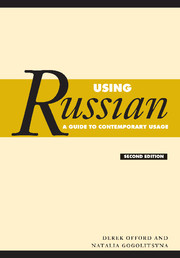Book contents
- Frontmatter
- Contents
- Preface to the first edition
- Preface to the second edition
- Acknowledgements
- Sources
- Note on transcription, stress marks and transliteration
- Glossary of linguistic terms
- List of abbreviations
- 1 Varieties of language and register
- 2 Passages illustrating register
- 3 Problems of meaning: Russian words
- 4 Problems of translation from English into Russian
- 5 Vocabulary and idiom
- 6 Language and everyday life
- 7 Verbal etiquette
- 8 Word-formation
- 9 Inflection
- 10 Prepositions
- 11 Syntax
- 12 Stress
- Index of Russian words, phrases and affixes
- General index
Preface to the first edition
Published online by Cambridge University Press: 05 June 2012
- Frontmatter
- Contents
- Preface to the first edition
- Preface to the second edition
- Acknowledgements
- Sources
- Note on transcription, stress marks and transliteration
- Glossary of linguistic terms
- List of abbreviations
- 1 Varieties of language and register
- 2 Passages illustrating register
- 3 Problems of meaning: Russian words
- 4 Problems of translation from English into Russian
- 5 Vocabulary and idiom
- 6 Language and everyday life
- 7 Verbal etiquette
- 8 Word-formation
- 9 Inflection
- 10 Prepositions
- 11 Syntax
- 12 Stress
- Index of Russian words, phrases and affixes
- General index
Summary
This book, like the volumes already published in the series on contemporary usage in French, German and Spanish, is aimed at the advanced learner who has studied the basic grammar of the language and is now striving for a more comprehensive and sophisticated knowledge. To this end the book includes much material on register, vocabulary, verbal etiquette and word-formation, as well as material on the subjects of morphology, prepositions and syntax with which the post-A-level student should already have some familiarity. The book is not conceived as a comprehensive grammar, although the main grammatical topics that trouble the English-speaking student are quite fully covered in the later chapters. The approach adopted is not prescriptive. That is to say an attempt is made to show the range of linguistic phenomena that might be encountered in modern Russian and to define the limits within which they are used rather than to lay down rules for usage.
While offering, it is hoped, a multi-faceted view of the modern language, two purposes are kept in mind throughout the book.
Firstly, it is intended to demonstrate that Russian, like any other modern language with which the student may be familiar, is not a stable, uniform abstraction that is applied inflexibly in all situations. As a living language spoken by millions of individuals of different ages from different backgrounds and in different situations, Russian exists in many varieties. Words, forms and constructions which are appropriate in one context may be quite out of place in another.
- Type
- Chapter
- Information
- Using RussianA Guide to Contemporary Usage, pp. xiii - xivPublisher: Cambridge University PressPrint publication year: 2005



